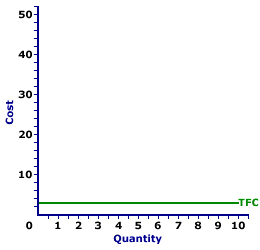
|
|
LONG-RUN AGGREGATE MARKET: A macroeconomic model relating the price level and real production under the assumption that ALL prices flexible. This is one of two aggregate market submodels used to analyze business cycles, aggregate production, unemployment, inflation, stabilization policies, and related macroeconomic phenomena. The other is the short-run aggregate market. The long-run aggregate market isolates the interaction between aggregate demand and long-run aggregate supply. The key assumption of this model is that ALL prices, especially resource prices, are flexible. The primary result of this model is that the economy achieves long-run equilibrium at full-employment real production.
Visit the GLOSS*arama
|
|


|

|
                           TOTAL FIXED COST CURVE: A curve that graphically represents the relation between total fixed cost incurred by a firm in the short-run product of a good or service and the quantity produced. This curve is constructed to capture the relation between total fixed cost and the level of output, holding other variables, like technology and resource prices, constant. Because total fixed cost are, in fact, fixed, the total fixed cost curve is, in fact, a horizontal line. The total fixed cost curve is one of three total cost curves, the other two are total cost curve and total variable cost curve. | Total Fixed Cost Curve |  |
The total fixed cost curve is the most straightforward of the three total curves (the other two being total cost curve and total variable cost curve). The reason for such straightforwardness is that total fixed cost is fixed. It is the same at all output levels.The total fixed cost curve can be derived in two ways. One is to plot a schedule of numbers relating output quantity and total fixed cost. The other is to vertically subtract the total variable cost curve from the total cost curve. The total fixed cost curve can be used to derive average fixed cost. Total fixed cost is visually illustrated by the graph to the right, which is the total fixed cost curve for the short-run production of Wacky Willy Stuffed Amigos (those cute and cuddly armadillos and tarantulas). The quantity of Stuffed Amigos production, measured on the horizontal axis, ranges from 0 to 10 and the total fixed cost incurred in the production of Stuffed Amigos, measured on the vertical axis, is $3 at each quantity of production. Because total fixed cost is fixed, the total fixed cost curve is a horizontal line that intersects the vertical axis at $3. If production is 0 Stuffed Amigos, total fixed cost is $3. If Stuffed Amigo production is 10, total fixed cost is $3. If production of Stuffed Amigos is boosted to a billion, then total fixed cost is $3.

Recommended Citation:TOTAL FIXED COST CURVE, AmosWEB Encyclonomic WEB*pedia, http://www.AmosWEB.com, AmosWEB LLC, 2000-2025. [Accessed: July 18, 2025].
Check Out These Related Terms... | | | | | | | | | | | | | |
Or For A Little Background... | | | | | | | | | | | | |
And For Further Study... | | | | | | | | | | | |
Search Again?
Back to the WEB*pedia
|



|

|
WHITE GULLIBON
[What's This?]
Today, you are likely to spend a great deal of time searching the newspaper want ads seeking to buy either an extra large beach blanket or a large flower pot shaped like a Greek urn. Be on the lookout for fairy dust that tastes like salt.
Your Complete Scope
This isn't me! What am I?
|

|
|
Three-forths of the gold mined each year is used to manufacture jewelry.
|

|
|
"A winner is someone who recognizes his God-given talents, works his tail off to develop them into skills, and uses those skills to accomplish his goals. " -- Larry Bird, basketball player
|

|
VC
Variable Cost
|

|
|
Tell us what you think about AmosWEB. Like what you see? Have suggestions for improvements? Let us know. Click the User Feedback link.
User Feedback
|


|


